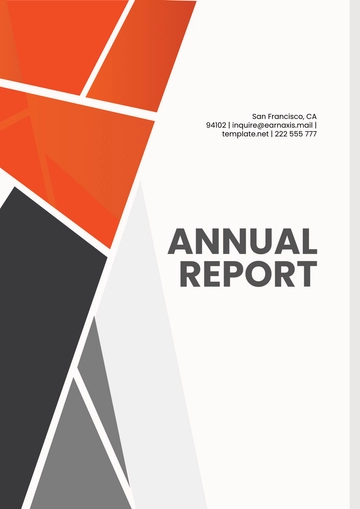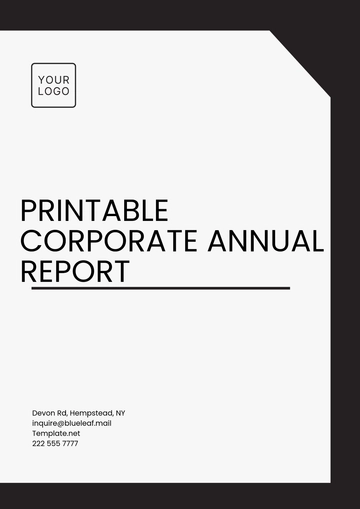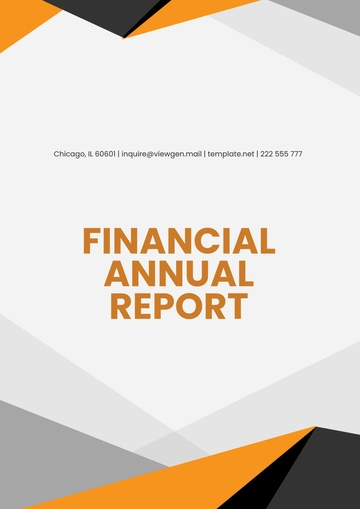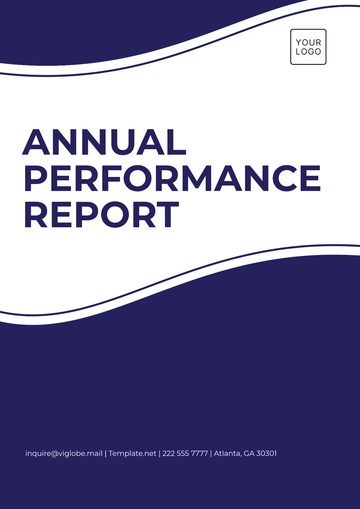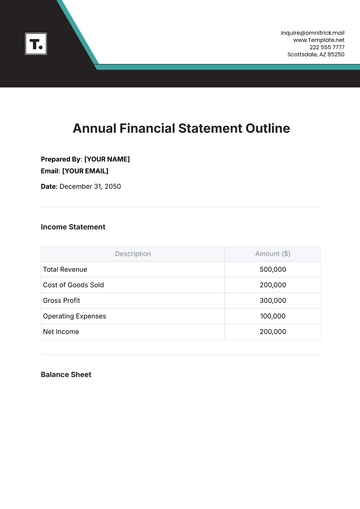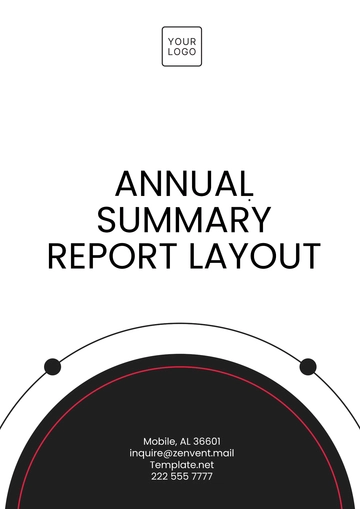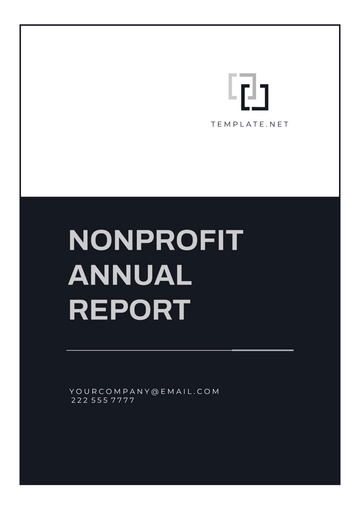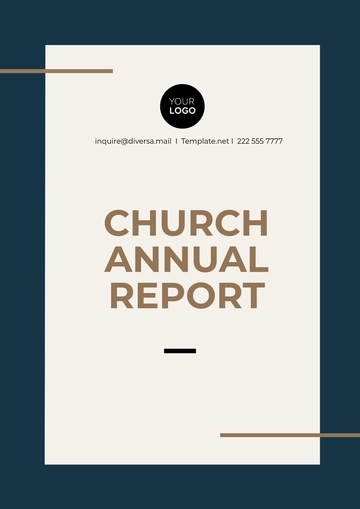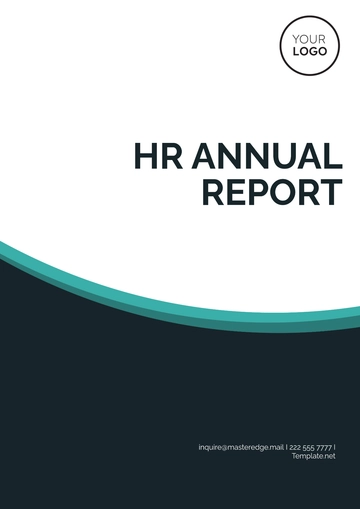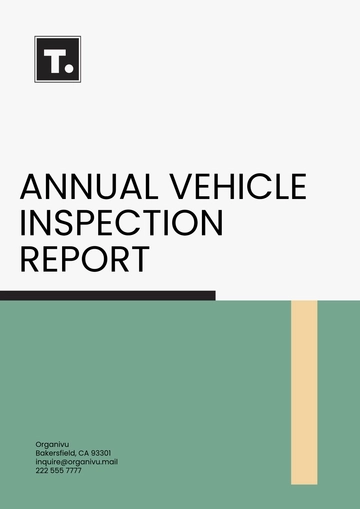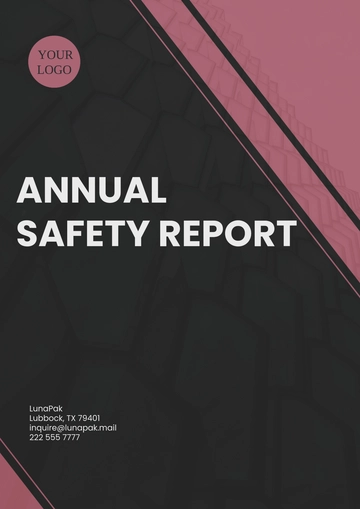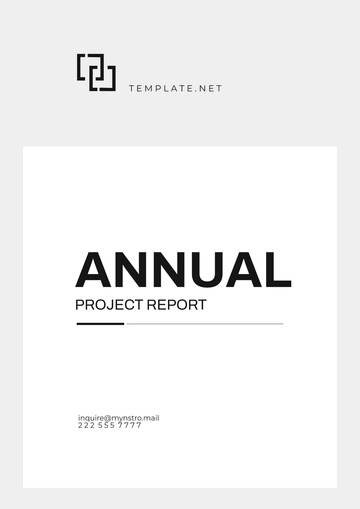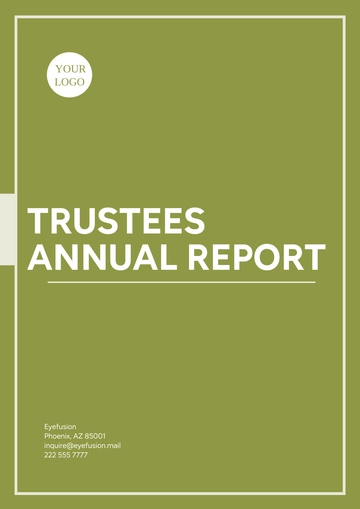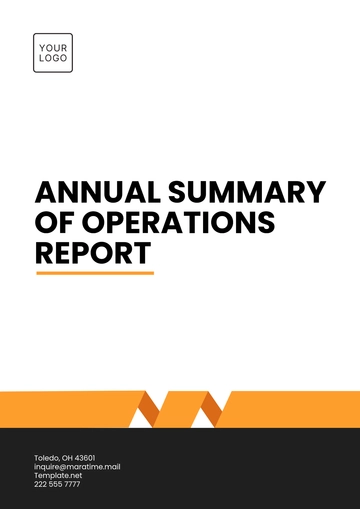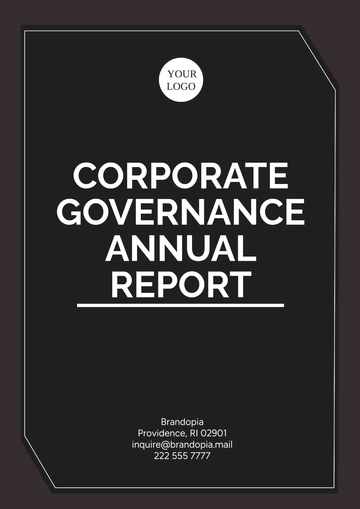Free Car Rental Annual Safety Report
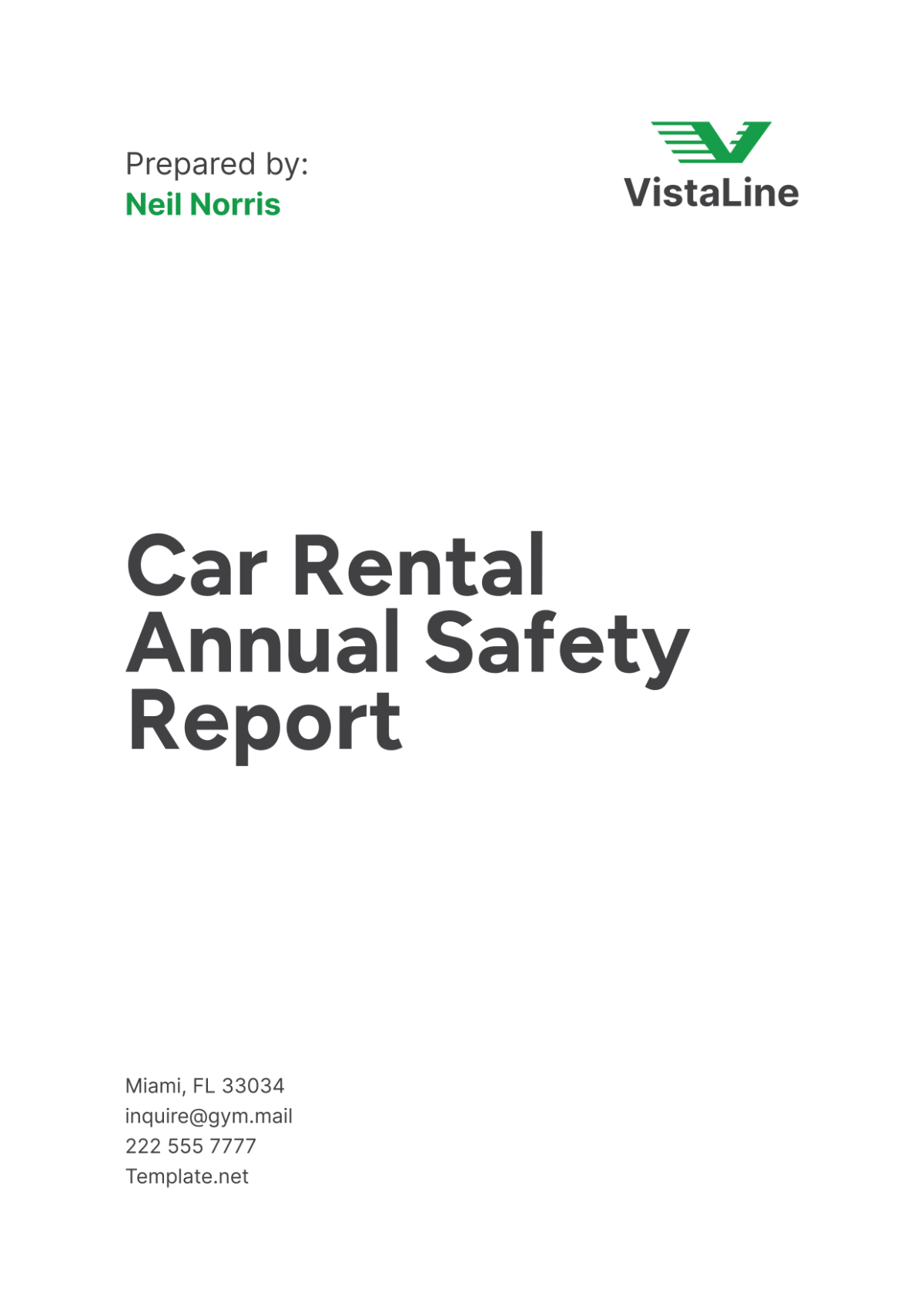
Year Ended: December 31, 2050
1. Executive Summary
The Car Rental Annual Safety Report for [Your Company Name] presents a comprehensive overview of the safety performance and initiatives undertaken throughout the year 2050. This report aims to provide stakeholders with a detailed analysis of our safety practices, incident statistics, risk management strategies, and continuous improvement efforts. Our commitment to safety is paramount, ensuring the well-being of our customers, employees, and the general public.
Key Highlights
Reduction in Incidents: One of the most significant achievements of the year was the 15% decrease in total incidents compared to the previous year. This reduction is a testament to our ongoing efforts to enhance safety measures across all operations. By focusing on preventive strategies and robust risk management, we have managed to lower the frequency of both minor and major incidents. This improvement not only boosts our reputation as a safe car rental company but also ensures the safety and satisfaction of our customers.
The decrease in incidents was driven by several initiatives, including improved vehicle maintenance protocols, enhanced driver training programs, and better incident reporting and response mechanisms. We implemented a more stringent maintenance schedule, ensuring that vehicles undergo thorough checks more frequently. Additionally, our driver training programs now include advanced modules on defensive driving and emergency response, equipping our drivers with the skills needed to avoid potential hazards.
Enhanced Training Programs: The introduction of advanced driver training modules focusing on defensive driving and emergency response has been a cornerstone of our safety strategy. These programs are designed to provide our drivers with the knowledge and skills necessary to handle a variety of situations on the road, from avoiding collisions to managing breakdowns efficiently.
Defensive driving training helps drivers anticipate and react to potential hazards, reducing the likelihood of accidents. The emergency response training ensures that drivers are prepared to take appropriate actions during breakdowns or other emergencies, minimizing the impact on customers and other road users. By investing in these training programs, we have not only improved the competency of our drivers but also enhanced the overall safety of our operations.
Vehicle Maintenance: We have implemented a rigorous maintenance schedule that has resulted in a 10% reduction in vehicle-related incidents. Regular maintenance is crucial to ensuring that our fleet remains in optimal condition, preventing mechanical failures that could lead to accidents. Our maintenance protocols include routine inspections, comprehensive checks at regular intervals, and pre-rental inspections to ensure that every vehicle is safe for use.
The maintenance schedule includes daily checks of critical components, such as brakes, tires, and lights, as well as more thorough inspections every 5,000 and 20,000 miles. By adhering to this schedule, we can identify and address potential issues before they become serious problems. This proactive approach to vehicle maintenance has significantly contributed to the reduction in incidents and enhanced the reliability of our fleet.
Customer Safety: In 2050, we launched a new customer safety app designed to provide real-time assistance and safety tips to our customers. The app is part of our commitment to leveraging technology to enhance the safety and convenience of our services. It includes features such as real-time GPS tracking, emergency contact information, and instant access to safety guidelines and tips.
The app also allows customers to report incidents directly, ensuring that we can respond promptly to any issues they encounter. By providing customers with these tools, we empower them to take an active role in their safety and ensure that they have the support they need during their rental experience. The positive feedback we have received from customers about the app highlights its effectiveness in improving safety and customer satisfaction.
These key highlights reflect our dedication to maintaining high safety standards and continuously improving our practices. The reduction in incidents, enhanced training programs, rigorous vehicle maintenance, and innovative customer safety measures demonstrate our commitment to providing a safe and reliable car rental service. As we look to the future, we will continue to build on these achievements and strive for even greater safety performance.
2. Introduction
Purpose
The purpose of this report is to document and evaluate the safety performance of [Your Company Name] over the past year. It serves as a tool for assessing the effectiveness of our safety measures and identifying areas for improvement.
Scope
This report covers all aspects of our safety operations, including incident statistics, training programs, vehicle maintenance, risk management, and continuous improvement initiatives. It includes data from all our rental locations and fleet operations.
3. Safety Performance Overview
Incident Statistics
Understanding our safety performance begins with analyzing incident statistics. These statistics help us identify trends, pinpoint areas of concern, and measure the impact of our safety initiatives.
Incident Type | Number of Incidents | Change from Previous Year (%) |
|---|---|---|
Minor Accidents | 120 | -10% |
Major Accidents | 20 | -5% |
Mechanical Failures | 50 | -20% |
Customer-Reported Safety Issues | 30 | -15% |
Total Incidents | 220 | -15% |
Key Performance Indicators (KPIs)
Key Performance Indicators (KPIs) provide a measurable way to track our safety performance. The following KPIs have been identified for the year 2050:
KPI | Target | Actual | Status |
|---|---|---|---|
Incident Rate per 1,000 Rentals | 5 | 4.5 | Achieved |
Customer Satisfaction (Safety) | 90% | 92% | Achieved |
Vehicle Downtime (Safety-Related) | 2% | 1.8% | Achieved |
Employee Training Completion Rate | 100% | 98% | Partially Achieved |
4. Safety Initiatives and Programs
Driver Training Programs
Our driver training programs are central to ensuring safe vehicle operation. In 2050, we expanded our training modules to include:
Defensive Driving: Techniques to anticipate and avoid potential hazards.
Emergency Response: Procedures for handling breakdowns and accidents.
Eco-Driving: Promoting fuel-efficient and environmentally friendly driving practices.
Vehicle Maintenance and Inspection
Maintaining our fleet in optimal condition is critical for safety. Our maintenance schedule includes:
Routine Inspections: Conducted every 5,000 miles.
Comprehensive Inspections: Conducted every 20,000 miles.
Pre-Rental Checks: Ensuring every vehicle is safe and ready for the customer.
Customer Safety Measures
Ensuring our customers' safety extends beyond vehicle maintenance. In 2050, we introduced:
Safety App: A mobile application providing real-time assistance, safety tips, and emergency contact information.
Safety Kits: Equipped all vehicles with first aid kits, reflective triangles, and fire extinguishers.
Safety Briefings: Provided customers with a brief safety orientation at the time of rental.
5. Risk Management
Risk Identification
Identifying potential risks is the first step in effective risk management. Key risks identified in 2050 include:
Driver Fatigue: Long rental periods leading to driver fatigue.
Mechanical Failures: Unforeseen mechanical issues.
Environmental Hazards: Adverse weather conditions affecting driving safety.
Customer Negligence: Customers not adhering to safety guidelines.
Risk Mitigation Strategies
To mitigate these risks, we implemented the following strategies:
Driver Fatigue: Introduced mandatory rest periods for long rentals.
Mechanical Failures: Enhanced our predictive maintenance systems using telematics data.
Environmental Hazards: Developed a weather alert system to inform customers of adverse conditions.
Customer Negligence: Strengthened our customer education programs regarding safety practices.
6. Incident Reporting and Investigation
Incident Reporting Process
Timely and accurate incident reporting is crucial for effective management. Our incident reporting process includes:
Immediate Reporting: Customers and employees are required to report incidents immediately using our dedicated hotline or mobile app.
Initial Assessment: The support team conducts an initial assessment to determine the severity and required response.
Documentation: All incidents are documented using our incident report form.
Investigation Procedures
Investigating incidents helps us understand root causes and prevent recurrence. Our investigation procedures include:
Fact Gathering: Collecting all relevant information, including witness statements, vehicle data, and environmental conditions.
Analysis: Analyzing the facts to identify the root cause of the incident.
Corrective Actions: Implementing corrective actions based on the findings.
Reporting: Preparing a detailed incident report for internal review and regulatory compliance.
7. Continuous Improvement
Feedback Mechanisms
Continuous improvement relies on feedback from customers and employees. Our feedback mechanisms include:
Customer Surveys: Conducted after each rental to gather feedback on safety and overall experience.
Employee Feedback: Regularly collected through surveys and meetings to identify potential improvements.
Incident Reviews: Analyzing incidents to identify areas for improvement.
Safety Audits and Reviews
Regular safety audits and reviews help ensure our procedures are effective and up to date. In 2050, we conducted:
Quarterly Safety Audits: Comprehensive audits of all rental locations and fleet operations.
Annual Safety Review: A detailed review of our safety performance and procedures, leading to the development of this report.
8. Summary
The safety performance of [Your Company Name] in 2050 demonstrates our unwavering commitment to maintaining the highest standards of safety for our customers and employees. Through dedicated efforts and strategic initiatives, we achieved significant improvements in various aspects of our operations. Notably, we observed a substantial reduction in incidents, an increase in customer satisfaction, and enhanced vehicle maintenance practices. These accomplishments reflect our proactive approach to safety and our ability to adapt to evolving industry standards and customer expectations.
Key Achievements in 2050
Incident Reduction:
We successfully reduced the total number of incidents by 15% compared to the previous year. This reduction is a direct result of our comprehensive safety initiatives, including advanced driver training programs and rigorous vehicle maintenance schedules. By focusing on preventive measures and equipping our staff with the necessary skills, we have significantly enhanced the overall safety of our operations.
Customer Satisfaction:
Customer satisfaction, particularly regarding safety, has been a focal point of our efforts. Through the introduction of a new customer safety app and continuous improvements in our service delivery, we have achieved a 92% satisfaction rate. This high level of customer satisfaction underscores the effectiveness of our safety measures and our commitment to providing a secure and reliable rental experience.
Vehicle Maintenance:
Our enhanced maintenance protocols have led to a 10% reduction in vehicle-related incidents. By implementing a more rigorous maintenance schedule and utilizing advanced diagnostic tools, we ensure that our fleet is in optimal condition. Regular inspections and timely repairs have minimized the risk of mechanical failures, contributing to the overall safety of our operations.
Future Goals
As we look ahead, [Your Company Name] remains committed to further enhancing our safety performance. Our future goals are designed to build on the successes of 2050 and address emerging challenges in the car rental industry. These goals include:
Further Reduce Incidents:
Improving Training Programs: We will continue to refine and expand our driver training programs. By incorporating the latest safety protocols and technologies, we aim to equip our drivers with advanced skills in defensive driving, hazard anticipation, and emergency response. Regular training updates and practical simulations will ensure that our staff remains well-prepared to handle any situation on the road.
Enhancing Maintenance Schedules: To further reduce vehicle-related incidents, we will implement even more stringent maintenance schedules. This will involve increasing the frequency of routine inspections and utilizing predictive maintenance technologies to identify potential issues before they escalate. By maintaining our fleet in peak condition, we can prevent breakdowns and ensure the safety of our customers.
Enhance Customer Safety:
Introducing New Safety Features: In response to evolving customer expectations and technological advancements, we plan to introduce new safety features in our vehicles. These may include advanced driver-assistance systems (ADAS) such as adaptive cruise control, lane-keeping assistance, and automatic emergency braking. By integrating these technologies, we can provide an added layer of safety for our customers.
Leveraging Technology: We will continue to enhance our customer safety app, adding new functionalities to provide real-time assistance and personalized safety tips. Additionally, we will explore the use of artificial intelligence (AI) and machine learning to offer predictive safety recommendations based on driving patterns and environmental conditions.
Strengthen Risk Management:
Advanced Predictive Analytics: To improve our risk management capabilities, we will implement advanced predictive analytics. By analyzing historical data and identifying trends, we can proactively address potential risks and develop targeted mitigation strategies. This data-driven approach will enable us to anticipate and prevent incidents more effectively.
Comprehensive Risk Assessments: We will conduct regular and comprehensive risk assessments to identify emerging threats and vulnerabilities. These assessments will inform our risk mitigation plans and ensure that we remain prepared for any challenges that may arise. Collaboration with industry experts and continuous monitoring of safety standards will further enhance our risk management efforts.
In summary, the safety performance of [Your Company Name] in 2050 highlights our dedication to maintaining a secure and reliable car rental service. The significant improvements in incident reduction, customer satisfaction, and vehicle maintenance are a testament to our proactive approach to safety. As we move forward, we are committed to further reducing incidents, enhancing customer safety, and strengthening our risk management practices. By setting ambitious future goals and continuously striving for excellence, we aim to uphold our reputation as a leader in safety within the car rental industry. For any questions or further information, please contact [Your Name] at [Your Company Email].
9. Appendices
Appendix A: Incident Report Form
Field | Description |
|---|---|
Date and Time | Date and time of the incident |
Location | Exact location of the incident |
Vehicle Details | Make, model, and license plate number |
Customer Details | Name, contact information, and rental agreement number |
Description of Incident | Detailed description of the incident |
Actions Taken | Summary of immediate actions taken |
Witness Statements | Statements from any witnesses |
Photographs | Any photographs of the incident scene |
Follow-Up Actions | Any additional actions required |
Appendix B: Training Curriculum
Module | Content |
|---|---|
Defensive Driving | Techniques to anticipate and avoid potential hazards |
Emergency Response | Procedures for handling breakdowns and accidents |
Eco-Driving | Promoting fuel-efficient and environmentally friendly driving practices |
Vehicle Maintenance | Basic maintenance tasks and identifying potential issues |
Customer Safety | Guidelines for ensuring customer safety and handling safety concerns |
Appendix C: Safety App Features
Feature | Description |
|---|---|
Real-Time Assistance | Provides customers with real-time assistance in case of an emergency |
Safety Tips | Offers tips on safe driving practices and vehicle maintenance |
Emergency Contacts | Lists emergency contact numbers for quick access |
Incident Reporting | Allows customers to report incidents directly through the app |
GPS Tracking | Enables tracking of vehicle location for safety and recovery |
Conclusion
The comprehensive Car Rental Annual Safety Report for [Your Company Name] highlights our ongoing efforts to ensure the safety of our customers and employees. By continuously improving our safety measures, training programs, and risk management strategies, we are committed to maintaining the highest standards of safety in the car rental industry. We thank our dedicated team and valued customers for their continued support and look forward to achieving even greater safety milestones in the future. For any questions or further information, please contact [Your Name] at [Your Company Email].
- 100% Customizable, free editor
- Access 1 Million+ Templates, photo’s & graphics
- Download or share as a template
- Click and replace photos, graphics, text, backgrounds
- Resize, crop, AI write & more
- Access advanced editor
Streamline your safety reporting with Template.net's Car Rental Annual Safety Report Template. This resource is designed for thoroughness and ease, offering a structured format that covers all essential safety metrics. Fully editable and customizable with our AI editor tool, this template ensures that your safety data is both comprehensive and clear. Perfect for annual reviews and audits.
You may also like
- Sales Report
- Daily Report
- Project Report
- Business Report
- Weekly Report
- Incident Report
- Annual Report
- Report Layout
- Report Design
- Progress Report
- Marketing Report
- Company Report
- Monthly Report
- Audit Report
- Status Report
- School Report
- Reports Hr
- Management Report
- Project Status Report
- Handover Report
- Health And Safety Report
- Restaurant Report
- Construction Report
- Research Report
- Evaluation Report
- Investigation Report
- Employee Report
- Advertising Report
- Weekly Status Report
- Project Management Report
- Finance Report
- Service Report
- Technical Report
- Meeting Report
- Quarterly Report
- Inspection Report
- Medical Report
- Test Report
- Summary Report
- Inventory Report
- Valuation Report
- Operations Report
- Payroll Report
- Training Report
- Job Report
- Case Report
- Performance Report
- Board Report
- Internal Audit Report
- Student Report
- Monthly Management Report
- Small Business Report
- Accident Report
- Call Center Report
- Activity Report
- IT and Software Report
- Internship Report
- Visit Report
- Product Report
- Book Report
- Property Report
- Recruitment Report
- University Report
- Event Report
- SEO Report
- Conference Report
- Narrative Report
- Nursing Home Report
- Preschool Report
- Call Report
- Customer Report
- Employee Incident Report
- Accomplishment Report
- Social Media Report
- Work From Home Report
- Security Report
- Damage Report
- Quality Report
- Internal Report
- Nurse Report
- Real Estate Report
- Hotel Report
- Equipment Report
- Credit Report
- Field Report
- Non Profit Report
- Maintenance Report
- News Report
- Survey Report
- Executive Report
- Law Firm Report
- Advertising Agency Report
- Interior Design Report
- Travel Agency Report
- Stock Report
- Salon Report
- Bug Report
- Workplace Report
- Action Report
- Investor Report
- Cleaning Services Report
- Consulting Report
- Freelancer Report
- Site Visit Report
- Trip Report
- Classroom Observation Report
- Vehicle Report
- Final Report
- Software Report
